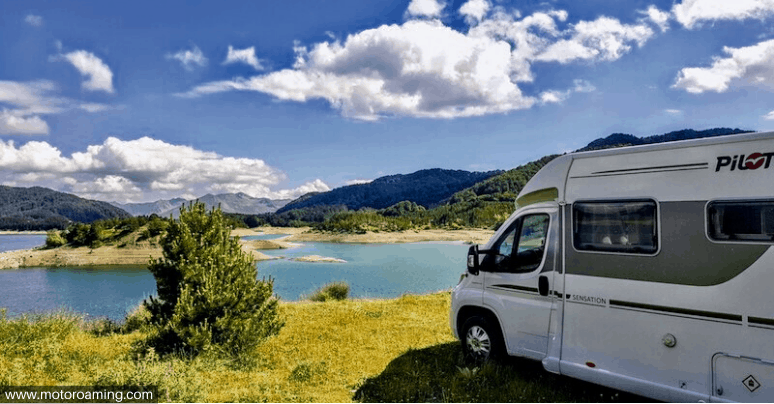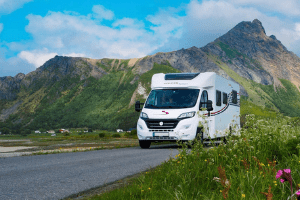Have you ever thought about living in a motorhome? Not just using it for the odd holiday, or a road trip across the country – but actually calling it your home?
It’s not a way of living many choose. You have to really love being in your motorhome, for most or all of the time.
But if it’s something you’re considering, and are wondering whether it’s right for you, then we’ve come up with a brief guide on the pros and cons of living in a motorhome full-time, as well as the other considerations you’ll have to take into account.
Is it legal to live in a motorhome or campervan full-time?
Yes – there are no UK laws stopping you from living in your motorhome, campervan or van full-time. The only requirement is that your vehicle has passed its MOT and is fully road legal.
However, there may be restrictions on where you can park up and reside, which you’ll need to research yourself depending on where you decide to go.
The allure of motorhome living comes from being able to take your home with you, but this doesn’t mean you can park up anywhere.
For example, local authorities across the UK and Europe might have restrictions on whether you are or aren’t allowed to park up in a street or layby and spend the night there. It also might not be safe to do so. If you’re unsure on where you can and can’t park (particularly at night time), be sure to consult The Highway Code guide.
The Pros and Cons of Living in a Motorhome (or Campervan)
Space
One of the most obvious differences between living in a motorhome and living in a house is the limited space available to you.
But if you are living in a motorhome, RV or Winnebago you typically have much more space to work with than if you’re living permanently in a campervan.
Pros
- Cleaning. You can clean the entire interior and exterior of your motorhome in around an hour, granting you more time for fun activities and relaxing. Plus, the range of plug-in 12V and rechargeable handheld vacuum cleaners available on the market makes cleaning your vehicle easier than it’s ever been.
- Less jobs = more time. Having a smaller space to maintain and keep clean creates plenty of opportunities to spend time with your friends and family.
Cons
- Lack of space. Some people like their space. And if there are a few people who will be living in your motorhome, there won’t be a lot going spare. Everyone will probably have to share one bathroom, and the beds are likely to be close together.
- Mess and untidiness. Unless kept under control, mess could become more of a problem due to living in smaller space. This will again be exacerbated if there are a few people living in the vehicle as it can be easy to become frustrated at a lack of space to store belongings.
Simply put, if you want time and space by yourself, full-time motorhome life probably isn’t for you.
Mobility
Living in a motorhome, camper or RV means you can go wherever you want, whenever you like. This is arguably the main reason people choose to live in a motorhome.
You never have to stay in one spot for longer than necessary.
Pros
- Enjoy complete freedom. Travel practically anywhere in the UK and Europe, knowing that you have a bed to sleep in at night wherever you are.
- Live in incredible places. With the complete freedom that full-time motorhoming allows, you might find yourself drinking your morning coffee overlooking Lake Windermere one day or in the Brecon Beacons the next.
- Stay as long as you like. Living in a motorhome means you can stay in one place as long as you want to (provided you have somewhere suitable to park up). Then just jump behind the wheel and leave for the next leg of your adventure.
Cons
- Challenging to drive. Motorhomes can be difficult to drive around, especially if you’re not particularly experienced in this area. If you’re not overly confident driving vehicles larger than a car, you might want to think twice about living permanently in a motorhome. However, there are a number of motorhome training courses available if you want to improve your skills.
- Larger vehicles require a category C driving license. If you’ve passed your driving test before 1st January 1997 and you’re not yet 70, you are automatically allowed to drive vehicles as heavy as 7.5 tonnes. However, anyone with a standard UK license can drive motorhomes and campervans under 3.5 tonnes, and to cater to this the majority of new motorhomes are manufactured with a Maximum Allowable Mass (MAM) of 3.5 tonnes. You can use the government resource to check which vehicles you can drive.
- One of the only limitations on motorhome living is where you can and can’t park. As mentioned above, it’s advisable to plan your parking before you set off on the next leg of your journey – and this itself may incur some monetary costs.
Cost of living in a motorhome or campervan
Whether you live in a house, flat or a motorhome – there are different costs you need to be aware of. However, full-time living in a motorhome brings with it some very unique expenses which you might not have considered.
Pros
- Much cheaper than a house. Unless your circumstances are very unusual, living in a motorhome is less expensive than living in a house. In terms of how much money it costs to run on a day-to-day basis, motorhomes, RVs and campervans are cheaper.
- Park fees are affordable. The money you spend to park up somewhere for a few days won’t cost you the world. Most campsites are reasonably cheap to park up in.
- Petrol costs. If you stay in one place for a long time, you won’t have to worry too much about petrol costs.
Cons
Aside from the above, there are additional costs that come with living in a motorhome.
- Cost to buy vehicle. The most obvious is the price of a motorhome itself. They can be quite expensive, especially if you want a newer model. However, when compared to the cost of a house, the cost is minimal.
- Insurance. And the insurance will be higher if you’re living in it full-time, as opposed to just using it for a holiday every now and again.
- Budgeting. It can be difficult to create a budget when costs are so varied in different places. You could find yourself spending more than usual in a certain location.
Travelling
You don’t normally stay in one place if you’re living in a motorhome. Typically, you will visit lots of different parts of the UK. You may even find yourself visiting different countries in Europe, which is one of the fantastic benefits of motorhome living.
Pros
- Sense of adventure. If you have a sense of adventure, then the motorhome life is wonderful.
- See new places. The motorhome life allows you to meet new people and experience different ways of living.
- No two weeks will be the same – you won’t get bored of doing the same thing over and over.
- No restrictions. If you’ve made the decision to live in your motorhome and travel, you won’t be restricted by what you can do, and where you can go.
Cons
- No fixed abode. Some people prefer to stay in one place – mainly because they might have friends and family nearby, and always being on-the-move means they see them less. However, the beauty of your situation is that you can choose to stay somewhere as long as you like. If you like where you are, you can stay put.
- Postal address. Not having a fixed address can be complicated when it comes to getting post, paying off bills and filling out forms.
- Local amenities. You might find it difficult to not have a local doctor or dentist that you know and trust. Living in a motorhome means that you won’t have the convenience of these local services.
Key things to consider
Post
As mentioned above, you will still need to receive your post. You’ll still need to receive your
However, it is not possible to get it sent to your motorhome as you are not likely to be in the same place for long.
So, what are the options for receiving post when you live in a motorhome?
- Get your post delivered to a relative or friend. This is a popular option as it allows you a safe and trusted place to receive your post. That way, if you receive an important document you know it can be delivered to someone you trust.
- Your right to vote. If you are going to get your post sent to someone who lives alone (and thus pays a reduced council tax bill), you will be giving up your right to vote. This is because you can’t register on the electoral roll. It is important to have a postal address because the company that provides your motorhome insurance will need somewhere to send the documents.
- Other options. If you don’t have an option of a friend or family’s address to send to, you could always consider other options like renting a virtual mailbox. Some services will receive, scan and email you your mail confidentially so that you can receive your postal correspondence while on the move.
Cold Weather
Keeping warm in winter can be a struggle in some houses let alone a motorhome. This is when the choice of vehicle is important.
- Choose a well-insulated vehicle. More are well-insulated and have double glazing but you will inevitably find yourself using more gas during the winter. This is why it is a good idea to book some campsites for this season so you can hook up to the electric supply rather than spending excessive money on gas. In this situation, it’s a good idea to look out for campsites that include electricity in their pitch fee.
- Water tanks. In most modern motorhomes, your water tanks are located underneath the vehicle but with a kind of heated flooring to prevent them from freezing. If they aren’t protected and are located under the vehicle, then they can be prone to freezing.
Best Motorhomes and Campervans to live in
There’s no “best” vehicle for you to live full-time in, as everyone has their own specific requirements. Some people might want a smaller, compact B Class van that allows them the freedom they want to live how they want.
However, some might want a more lavish A Class bus with every amenity you can imagine from a motorhome.
It all depends on your budget and your priorities.
If space is important to you, then an A Class or C Class motorhome would be the better choice for you.
If you’re more concerned about budget, or perhaps you might be considering a campervan conversion.
Is full-time motorhome life right for me?
It’s really down to personal preference.
Hopefully we’ve given you enough of an idea on what life on-the-road is like, so you can decide if it’s right for you – we also have an updated version of this guide to provide you with more information.
If you choose to give it a go, then we’d love to hear about your experiences!
And, as always, ensure you have suitable insurance for your travels.
Image courtesy of www.motoroaming.com













